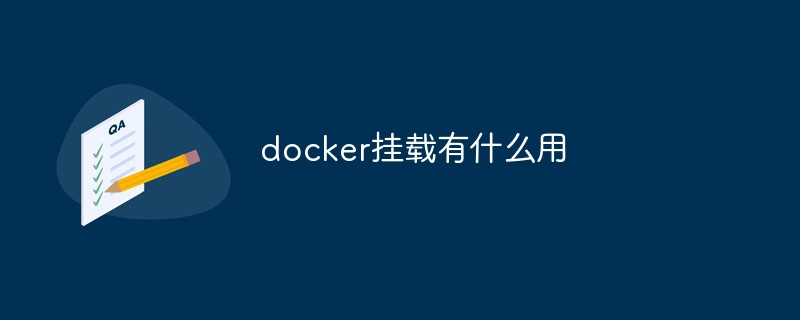
In docker, mounting can overwrite files or folders in the container with local files or folders. File mounting will not have any impact on other files in the same folder and can be implemented on the host machine. Automatic two-way data synchronization with the container directory.

The operating environment of this tutorial: linux7.3 system, docker-1.13.1 version, Dell G3 computer.
Docker mounting is to overwrite the files or folders in the container with local files or folders
Note: docker mounting configuration file When doing this, you must be careful not to write the wrong content in the configuration file to be mounted, otherwise the container will not start after you create it
Background introduction
docker volume allows us to start the docker container. Dynamically mount some files (such as configuration files) to overwrite the original files in the image
Folder mounting
The folder on the host will definitely overwrite the container Folder:

# Allow non-existent folders or existing empty folders to be mounted into the container, and the corresponding folders in the container will be cleared
Mounting a non-empty folder into the container will overwrite the original folder in the container
File mounting
The biggest difference between file mounting and folder mounting is :
docker prohibits mounting files that do not exist on the host to files that already exist in the container
File mounting will not have any impact on other files in the same folder
Mounting existing files into the container will overwrite the corresponding files in the container. If the file does not exist, create a new one.
Summary
The files on the host will definitely overwrite the files in the container

Application Scenario
From the above analysis, it can be seen that folder mounting covers files in units of the entire folder, so a large number of files can be mounted when a large number of files need to be mounted. It is used when entering the container. In addition, if an empty folder or a non-existent folder is mounted, it is generally used in reverse: that is, after the container is started, some files (such as logs) may be generated under the folder of the mount point in the container. ), at this time, you can see it directly in the folder on the corresponding host.
File mounting will only overwrite a single file and will not affect other files in the same folder in the container. It is often used to mount configuration files to dynamically modify the default configuration at runtime.
Recommended learning: "docker video tutorial"
The above is the detailed content of What is the use of docker mounting?. For more information, please follow other related articles on the PHP Chinese website!
 The difference between k8s and docker
The difference between k8s and docker
 What are the methods for docker to enter the container?
What are the methods for docker to enter the container?
 What should I do if the docker container cannot access the external network?
What should I do if the docker container cannot access the external network?
 What is the use of docker image?
What is the use of docker image?
 The difference between css3.0 and css2.0
The difference between css3.0 and css2.0
 Free erp management system software
Free erp management system software
 How to enable secondary logon service
How to enable secondary logon service
 js rounding
js rounding